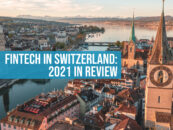
10 Must-Read Fintech, Regtech and Blockchain Research Papers
by Fintechnews Switzerland August 25, 2017Fintech has taken the finance and banking sector by storm, especially as a response to the 2008 financial crisis. Many academics and experts have explored the emergence of trend, and study the opportunities and challenges that digital platforms, cutting-edge technologies and new business models have brought to the sector.
Today, we look at ten must-read research papers that explore fintech, blockchain, regtech, and regulation, among other related topics.
The Evolution of Fintech: A New Post-Crisis Paradigm?
University of Hong Kong Faculty of Law Research Paper No. 2015/047
UNSW Law Research Paper No. 2016-62
 Since 2008, a new era of fintech has emerged in both the developed and developing world. The latest evolution of fintech, led by startups, poses challenges for regulators and market participants alike, notably in balancing the potential benefits of innovation with the possible risks of new approaches.
Since 2008, a new era of fintech has emerged in both the developed and developing world. The latest evolution of fintech, led by startups, poses challenges for regulators and market participants alike, notably in balancing the potential benefits of innovation with the possible risks of new approaches.
This research paper analyzes the evolution of fintech over the past 150 years, and on the basis of this analysis, argues against its too-early or rigid regulation at this juncture which could potentially stifle innovation.
FinTech, RegTech and the Reconceptualization of Financial Regulation
Northwestern Journal of International Law & Business, Forthcoming
University of Hong Kong Faculty of Law Research Paper No. 2016/035
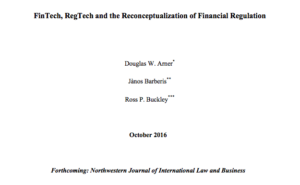 To date. regtech has been focused on the digitization of manual reporting and compliance processes, an area that’s offered tremendous cost savings to the financial services industry and regulators.
To date. regtech has been focused on the digitization of manual reporting and compliance processes, an area that’s offered tremendous cost savings to the financial services industry and regulators.
But the potential of regtech is far greater. In particular, regtech has the potential to enable a close to real-time and proportionate regulatory regime that identifies and addresses risk while facilitating more efficient regulatory compliance.
The research paper sets the foundation for a practical understanding of regtech and proposes several reforms that could benefit regulators, industry and entrepreneurs alike in the financial sector and other industries.
The Emergence of the Global Fintech Market: Economic and Technological Determinants
CESifo Working Paper Series No. 6131
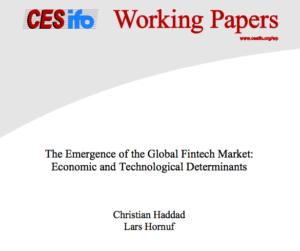 This paper investigates the economic and technological factors that push entrepreneurs to establish ventures with the purpose of reinventing financial services.
This paper investigates the economic and technological factors that push entrepreneurs to establish ventures with the purpose of reinventing financial services.
It found that countries witness more fintech startup formations when the latest technology is readily available, capital markets are well-developed, and people have more mobile telephone subscriptions. Moreover, the available labor force has a positive impact on the development of this new market segment.
Overall, it suggests that fintech startup formation should not be left to chance: active policies are needed to influence the emergence of this new sector.
Developing Blockchain Real-Time Clearing and Settlement in the EU, U.S., and Globally
Columbia Journal of European Law: Preliminary Reference (June 22, 2016)
 Clearing and settlement of international securities transactions present major challenges. But blockchain and other innovations are expected to disrupt the area.
Clearing and settlement of international securities transactions present major challenges. But blockchain and other innovations are expected to disrupt the area.
Blockchain technology creates the possibility of a tamper-proof consolidated audit trail, of almost infinitesimal transaction cost, and increased transactional velocity.
While true real-time clearing and settlement will remain utopia, banks and financial institutions are increasingly testing out these new technologies as they realize the threat of losing control of payment systems.
At the same time, the regulatory framework both in the U.S and the EU lags alarmingly behind the pace of technology.
This research paper explores these urging issues as the world prepare for the blockchain disruption.
The Future of Banking: The Role of Information Technology
Bancni vestnik: BANKING SECTOR AT THE CROSSROADS: CHALLENGES FOR THE FUTURE, Forthcoming
 This paper analyzes how information technology is transforming individual banks and the entire banking industry.
This paper analyzes how information technology is transforming individual banks and the entire banking industry.
While IT developments may lure banks into transaction banking (due to IT-driven cost efficiencies), these should not give up on relationship banking.
Instead, banks need to adjust themselves to consumers’ new preferences for IT-driven products and use IT developments to reconfigure or even reinvent relationship banking.
The entry of fintech startups and IT companies in traditional banking businesses is leading to drastic changes in banking. Government intervention and regulation will give banks additional time to adjust.
The Impact and Potential of Blockchain on the Securities Transaction Lifecycle
SWIFT Institute Working Paper No. 2015-007
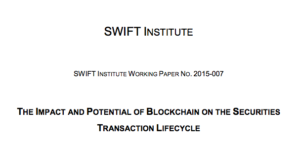 This paper by the SWIFT Institute reports the outcome of a series of interviews and focus group meetings with professionals working in post-trade processing and the provision of mutual distributed ledger services.
This paper by the SWIFT Institute reports the outcome of a series of interviews and focus group meetings with professionals working in post-trade processing and the provision of mutual distributed ledger services.
The objective was to hear about the industry’s views on the potential impact of mutual distributed ledger technology on post-trade processing global securities markets.
The research found that while the use of blockchain to validate operational data in mutual distributed ledgers can yield substantial reductions in both cost and risk, the concept of data sharing itself is far from new.
In order to achieve all the potential benefits, mutual distributed ledgers will require board level buy-in to a substantial commitment of time and resource, and active regulatory support for process reform, with relatively little short term payoff.
Fintech Platforms and Strategy
MIT Sloan Research Paper No. 5183-16
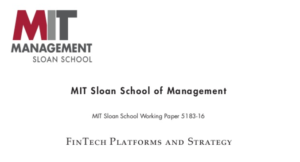 A major consequence of the Internet era is the emergence of advanced digital platforms that combine technology and process in new ways that often disrupt existing industry structures.
A major consequence of the Internet era is the emergence of advanced digital platforms that combine technology and process in new ways that often disrupt existing industry structures.
These platforms allow easy participation that often strengthens and extends network effects, while the vast amounts of data captured through such participation can increase the value of the platform to its participants, creating a virtuous cycle.
While initially slow to penetrate the financial services sector, such platforms are now beginning to emerge.
This research paper provides a taxonomy of platforms in finance and identifies the feasible strategies that are available to incumbents in the industry, innovators, and the major Internet giants.
The Fintech Market in Germany
Prof. Dr. Gregor Dorfleitner, Jun.-Prof. Dr. Lars Hornuf
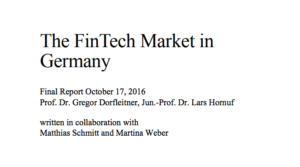 The study, conducted on behalf of the German Federal Ministry of Finance, provides the first comprehensive analysis of the German fintech industry.
The study, conducted on behalf of the German Federal Ministry of Finance, provides the first comprehensive analysis of the German fintech industry.
It provides a comprehensive overview of current trends and the drivers of growth that have affected the fintech industry in the past, as well as the factors that could spur and hinder growth within it in the future.
The paper quantifies the market volume of the industry between 2007 and 2015. On the basis of this data, the authors predict the future development of eight segments of the fintech market, offering detailed forecasts for the years 2020, 2025, and 2035.
Fintech and Financial Services: Initial Considerations
IMF Staff Discussion Notes No. 17/05
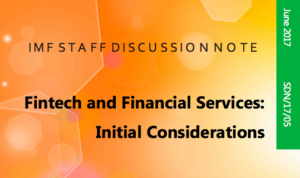 Rapid advances in digital technology such as artificial intelligence and cryptography are transforming the financial services landscape, creating opportunities and challenges for consumers, service providers, and regulators alike.
Rapid advances in digital technology such as artificial intelligence and cryptography are transforming the financial services landscape, creating opportunities and challenges for consumers, service providers, and regulators alike.
This paper reviews developments in this new wave of technological innovations and assesses their impact on an array of financial services.
It focuses on rapidly changing cross-border payments, a topic that’s in line with the IMF’s mandate to promote the stability of the international monetary system.
Using an economic framework, the paper discusses how fintech might provide solutions that respond to consumer needs for trust, security, privacy, better services, and change the competitive landscape.
The State of Small Business Lending: Innovation and Technology and the Implications for Regulation
Harvard Business School Entrepreneurial Management Working Paper No. 17-042
Harvard Business School General Management Unit Working Paper No. 17-042
 While some aspects of the economy have recovered in the years since the Great Recession, small businesses have struggled to get credit. Thankfully, a rapidly-growing fintech sector has quickly stepped in to fill this gap, and incumbent banks are exploring a variety of partnership strategies with the new entrants.
While some aspects of the economy have recovered in the years since the Great Recession, small businesses have struggled to get credit. Thankfully, a rapidly-growing fintech sector has quickly stepped in to fill this gap, and incumbent banks are exploring a variety of partnership strategies with the new entrants.
Yet, while the much-needed increase in sources for financing has been welcome by small businesses, these innovative fintech lenders have sparked concerns around transparency and the high costs charged to borrowers.
This paper takes a deep look at the current state of small business lending, the causes for the persistent low-dollar loan gap, the solutions being driven by innovative fintech lenders, and the key concerns around oversight and regulation.
Featured image credit: Pixabay




